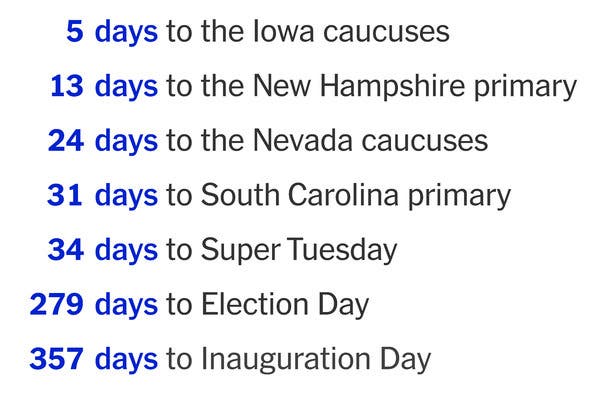Advertisement

Welcome to On Politics, a daily political analysis of the 2020 elections, based on reporting by Times journalists.
Sign up here to get On Politics in your inbox every weekday.
-
There were no new polls released in Iowa and New Hampshire on Tuesday, but the Democratic horse race was in the spotlight anyway as the presidential candidates focused on electability.
-
Joe Biden looked awfully pleased as he seized on a comment by Joni Ernst, a Republican senator from Iowa, to make his case that G.O.P. leaders privately see him as the toughest candidate. “She spilled the beans!” Biden said, citing her comment on Monday that she was “really interested” to see how the Trump impeachment lawyers’ arguments about Hunter Biden would affect Joe Biden on caucus night. Biden treated this like a smoking gun. “She just came out and flat said it,” he told a crowd in Muscatine, Iowa. “The whole impeachment trial for Trump is just a political hit job to try to smear me, because he is scared to death to run against me.”
-
Pete Buttigieg continues to hint (unsubtly) that nominating Bernie Sanders would be a needless risk, and on Tuesday he highlighted an area of concern for many moderate Democrats: what will happen to down-ballot prospects if the party selects a standard-bearer too far to the left. At an event in Ottumwa, Iowa, Buttigieg was asked if he would be willing to have a beer with Mitch McConnell, the Senate majority leader. After saying he would — and adding that he hoped he would be drinking with “a former United States senator” by then — Buttigieg made a prediction of sorts: “We can do that if we have the coattails,” he said of ousting McConnell and Republicans like him, “and the right nominee.”
-
Add to this a Democratic super PAC’s new plans to air attack ads in Iowa against Sanders over electability, and you have a closing week in Iowa in which policy positions and high-minded visions of the country have given way to appeals about who can beat Republicans.
-
Elizabeth Warren was stuck at the Senate trial for another day, as were Sanders and Amy Klobuchar. But she did manage to break into the news cycle after her criticisms of Alan Dershowitz, one of Trump’s lawyers and her former Harvard Law School colleague, drew a retort from the longtime litigator. Warren blasted Dershowitz’s arguments as “nonsensical” on Monday; he hit back on Twitter on Tuesday, saying she had “willfully mischaracterized what I said” and claiming she “doesn’t understand the law.”
-
An intriguing bit of news from our colleagues Jonathan Martin and Alexander Burns: Biden aides are discussing the possibility of seeking an alliance with Klobuchar in the Iowa caucuses. Her campaign signaled no interest in such a plan.
-
Sanders continues to receive good news from state-level polls (more on that below), but Biden is holding steady nationwide, according to a Quinnipiac University survey released on Tuesday. It found the former vice president garnering 26 percent of the vote, roughly on par with what he has garnered in Quinnipiac polls since the fall. But Sanders is on an upward trajectory: He received 21 percent in the poll, breaking the 20-percent mark in a Quinnipiac poll for the first time this cycle.
Photo of the day
A short day of closing arguments from the Trump legal team allowed Amy Klobuchar to fly in from Washington for a campaign event at Barley’s Taproom in Council Bluffs, Iowa, on Tuesday.
By Shane Goldmacher
Sanders is not only leading in (some) Iowa and most New Hampshire polls. A new survey of delegate-rich California by the U.C. Berkeley Institute for Governmental Studies, conducted for The Los Angeles Times, shows him pacing the field with 26 percent support. Warren was in second at 20 percent and Biden in third at 15 percent, clinging to the threshold to win delegates.
The poll is particularly significant because while the California primary is technically on March 3, voting will actually begin this week. That’s because county registrars are sending out vote-by-mail ballots by Feb. 3 — the day of the Iowa caucuses. And if a candidate runs up a quick advantage in early voting, he or she could be hard to catch on Election Day.
That 15 percent threshold is crucial. Campaigns must reach it in congressional districts to win delegates in them, and there are some warning signs for Biden, who was at only 11 percent in the San Francisco Bay Area, according to the poll.
The story of Sanders’s lead in California is centered on young voters. He got 54 percent among those under 29, and about two-fifths of those in their 30s. Here are the full results:
Sanders: 26 percent
Warren: 20 percent
Biden: 15 percent
Buttigieg: 7 percent
Bloomberg: 6 percent
Klobuchar: 5 percent
Yang: 4 percent
Steyer: 2 percent
The president held his first rally in New Jersey since taking office, packing the town of Wildwood with supporters — many of whom camped out in frigid temperatures. He was there to stump for Representative Jeff Van Drew, the anti-impeachment Democrat who, you might recall, flipped parties last month and pledged his “undying support” for the president.
Our colleague Katie Rogers was on the ground. Here’s her take:
I’ve been to dozens of Trump rallies by now, but this one has a particularly surreal backdrop: It’s taking place in a shuttered boardwalk town in the dead of winter, so most places are closed to the rowdy “Make America Great Again” crowd. Some of the streets are eerily empty, but for the people drifting around in Trump gear. Before the rally, some people were camping because the hotels are either closed or exorbitantly priced. I met a woman here who arrived on Sunday night and sat in a chair outside for the past two nights. She said it was all worth it once she was admitted into the venue at the front of the line. One definite theme I’m sensing is how desperate people seem to be for the opportunity to proudly fly their Trump flag in a blue-leaning state.
The president’s legal team on Tuesday wrapped up three days of defense arguments in the Senate impeachment trial. On Wednesday, a new question phase will begin; it is slated to take up to 16 hours, so it is expected to stretch on through Thursday evening.
Here’s Sheryl Gay Stolberg, one of our congressional correspondents, to explain how it works and what she’ll be watching for:
Unlike regular Senate debate, where senators speak on the floor, the question-and-answer portion of the impeachment trial will feature written questions — and unscripted answers. Senators will write down their questions for either the House impeachment managers or Trump’s defense team, and will then give them to their respective party leaders. (Much of the question-writing is already being coordinated behind closed doors.) Those leaders will then submit those questions to Chief Justice John Roberts, who will read them aloud at the trial.
I’ll be looking for both sides to try to poke holes in the others’ arguments. Keir Dougall, a former federal prosecutor, floated these for-instances: Trump’s defense team has argued that unless the president commits a crime, he cannot be impeached. So Democrats might ask: “What if a president decides to simply quit coming to work? That is not a crime. Can he be impeached then?” Meanwhile, Democrats have argued that the president was trying to advance his own political agenda. So Republicans might ask: “Doesn’t every president do that? Where do you draw the line?”
Until this week, it had appeared that the trial might wrap as soon as Friday. But on Sunday night, The Times reported that the former national security adviser John Bolton’s soon-to-be-published memoir contained passages that appear to contradict key elements of Trump’s legal defense. On Tuesday, Republican leaders were working feverishly to block testimony from Mr. Bolton or other witnesses but indicated they didn’t yet have the votes to do so.
-
Pete Buttigieg’s campaign is desperately trying to win the support of black and brown voters at the ballot box. But by some accounts, it has struggled to even win the confidence of its own minority staff members.
-
Senator Doug Jones is in a delicate political position, a Democrat in deep-red, pro-Trump Alabama. He faces re-election in November, and everything he says and does during the impeachment trial could put his support at risk.
-
A pro-Israel Democratic Super PAC will start to air attack ads against Sanders in Iowa as moderate Democrats worry that he could win the caucuses there.
-
Alexandria Ocasio-Cortez. An Olympic curling coach. A host of “Queer Eye.” With impeachment forcing the senators running for president off the campaign trail, their stand-ins have become the main attraction.
-
And finally, we nuzzled up to the dogs of the 2020 campaign trail, including those that have had their snout shaken by a certain billionaire former New York mayor. Fans on social media follow the dogs’ lives, learning of their hopes and passions — including those that have to do with peanut butter.
On Politics is also available as a newsletter. Sign up here to get it delivered to your inbox.
Is there anything you think we’re missing? Anything you want to see more of? We’d love to hear from you. Email us at onpolitics@nytimes.com.
-
- What is impeachment?
Impeachment is charging a holder of public office with misconduct.
- Can you explain what President Trump is accused of doing?
President Trump is accused of breaking the law by pressuring the president of Ukraine to look into former Vice President Joseph R. Biden Jr., a potential Democratic opponent in the 2020 election.
- What did the president say to the president of Ukraine?
Here is a reconstructed transcript of Mr. Trump’s call to President Volodymyr Zelensky of Ukraine, released by The White House.
- What is the impeachment process like?
Here are answers to seven key questions about the process.
- What is impeachment?



